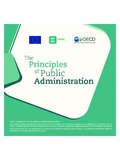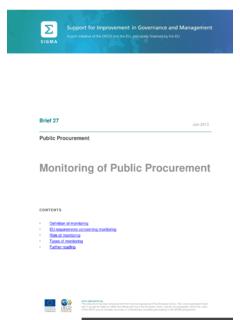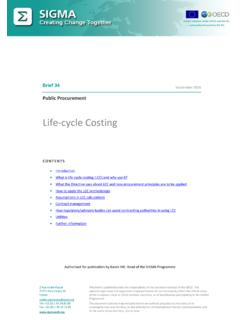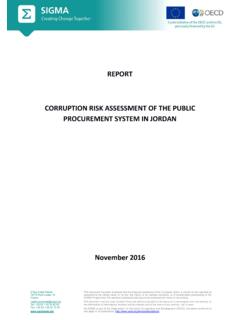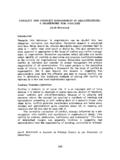Transcription of Promoting Ethical Values and Accountability in the …
1 SIGMA Support for Improvement in Governance and Management A joint initiative of the OECD and the European Union, principally financed by the EU This document has been produced with the financial assistance of the European Union. The views expressed herein are those of the author and can in no way be taken to reflect the official opinion of the European Union, and they do not necessarily reflect the views of the OECD and its member countries or of the beneficiary countries participating in the Sigma Programme. Promoting Ethical Values AND Accountability IN THE PUBLIC SERVICES Seminar Reforming the Civil Service in Georgia Tbilisi, Georgia 10-11 November 2009 Paper prepared by Eduard G roff EULEX Special Prosecutor, Head of Financial Crime Unit 2 Introduction Globalization, financial and fiscal crisis, technological advances, the will to overcome old structures together with the spreading democratization are the main challenges since about more than a dozen of years.
2 As a result, the public service (PS) faces new tasks, new service profiles and techniques and is under pressure to transform itself to respond to these changes. Equally the awareness is growing that an enhanced PS delivery is the hallmark of responsive governance and that the quality of PS is related to Ethical Values and Accountability of public institutions that deliver those services. First, I dare define the different terms I am speaking about. Public Services For this reason and speech, each kind and instance of administration and judiciary (judges and prosecution) are included. Ethics in PS Concepts of ethics describe a typical conception of a desired behavior, thinking or doing something. As to PS, it connotes all vital principles and acceptable norms of behavior that public officials are obliged to strictly adhere to in the process of dealing with citizenry.
3 The keywords integrity, fairness, impartiality, responsiveness and others belong to those Values of which embodiment one thinks to be important to spell out proper conduct and appropriate action. Furthermore, it comprises professionalism, effectiveness and efficiency, neutrality, honesty, cost-consciousness and others that become somewhat like the barometers for an Ethical culture in the PS. Accountability in PS Due to the relationship of PS to the citizenry it can be said that Accountability circumscribes (and means) the obligation to demonstrate and take responsibility for performance. When justifying and explaining its actions the PS must show transparency: PS should be required to disclose important information, incl. decision-making open to public scrutiny, Clarity of responsibility who acted, what was the decision, why (?)
4 Responsiveness to needs and expectations, setting priorities, Whereas the performance activities should be kept in balance with the capacity (authorities and skills [and resources]) of each party to deliver. 3 General Aspects Every country has its laws and sub-legal regulations for the members of the PS to follow as well as for citizens. These norms cannot describe each possible single aspect of life that may come to the fore in the future or that has occurred in the past. The member of PS often without proper education or experience has to cope with a lot of blanket norms, provisions as to discretionary decisions or to a certain scope of judgment evaluations. So if a decision does not match the expectation as per requested by the applicant, the procedure and/ or decision and its legality are contested.
5 We see a wide-spread ubiquitous use of the terms corruption or misconduct whereas this more or less inflated reproach becomes a customary label for all problems the so-called societies in transition face. Contrary to the discreet practice of corruption, in which a huge number of citizen participate, that is not even perceived as such, the terms corruption or misconduct play the role to define the source of all evil in public discourse. Thus, its meaning blurs and solely serves as an eroded explanation for alleged or factual social inconsistencies, inequality and unjust redistribution of national wealth. Linked hereto it shows a remarkable decline of confidence in PS structures. To tackle that problem outlined we need to have a multifarious approach regarding different groups affected and to have a look at: The law-makers and the laws including the political parties and their role esp.
6 During and before elections; The administration with all regulations, instructions, by-laws etc. and the thereupon based decision; The judiciary with its rulings and judgment; And last not least the citizens and the media; whereas all groups can be considered victims and culprits. I assume that for each part of PS and its tasks appropriate laws have been put in force. Of course, this should be normality, since good and well-rounded laws are a first hindrance for intentional malpractice. At the same time, such laws are indispensable for creating grounds and spirit of Ethical Values . Referring to the above-mentioned difficulties or irregularities it should be clear that each law should not be fraught with unnecessary norms as to blanket provisions, possibilities for execution of discretionary power or measurement issues.
7 If there is a not well-balanced structure especially the less experienced and educated PS member will suffer difficulties or they are unwilling and/ or incapable to deal with legal matters properly. This means equally that beside the implementation of norms narrowly or extensively to be interpreted you need to have parallel along going education (advanced training) to avoid reproaches for mistakes or wrong-doing. 4 Factors that Facilitate and Support Ethical Deficit and Lack of Accountability That is (the first time) we have to look intensively at Ethical deficits and lacks of Accountability . Concepts of ethics and Accountability connote a kind of behavior of integrity and responsibility that members of PS must strictly adhere to in delivering their services to the populace, but too many ingredients are missing when you look at the reality.
8 At that time I would like to stress that the following representation describes general considerations concerning Ethical deficits etc. not specifying a certain country s background even though these remarks are based on the experience I made in different countries esp. in South-east Europe. The answers to the problems touched on are given partly implicit and partly in a separate paragraph where I will try to explain how to improve the situation and whereupon one can start revising Ethical value related services. Lack of professionalism In certain regions worldwide you will face such a lack of professionalism based on different aspects as insufficient education and/ or experience. Not unusually it starts with selective recruitments that are orientated towards anything else but education or experience.
9 The result is poor quality of services delivered and a huge number of non-competitive and non-aspiring staff only waiting for payday. PS staffs have been assigned because of their political connections, family ties or affiliation to ethnic groups and other non job-related motives. Even if there are clear rules for an appointment these rules do not work well since there is no or no real control mechanism or chance to appeal. So, many applicants have to accept shady dealings ( a part of the salary has to be given to the patron ), but on the other side a lot of them do not have degrees (High School, Admin Colleges, Universities) as prescribed in the advertisement. Furthermore, there are no possibilities to advance, either there are too many employees or no vacancies or no career plan.
10 These points normally are more or less combined with a bad or totally absent staff evaluation system (staff appraisal regulation with unclear or meaningless criteria) and the absence of merit based promotion. You can imagine that such facts will produce discontent and during a disciplinary or criminal investigation you will hear that the staff member felt compelled to resort to corrupt measures in order to get even. As a last result to that point you see a huge decline of integrity and honesty and at least serious conflicts of interest. Remuneration Besides bad working conditions ( in comparison to private companies) you have to deal with the salary issue, since the salary often is not really competitive with that offered by private institutions for the same qualification.
